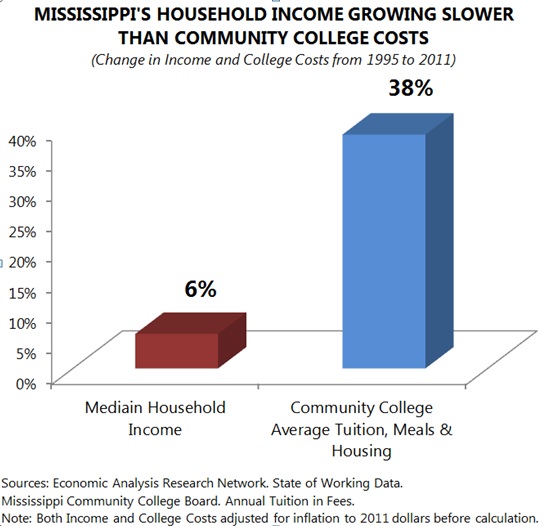Simply put, the incomes families earn are not keeping pace with the increases in tuition across Mississippi’s community college system. Since 1995, Mississippi’s median household income has risen 6 percent after accounting for inflation (see chart). In contrast, the cost of tuition, housing and a 5-day meal plan at Mississippi’s community colleges has grown by 38 percent.
As college costs grow faster than income, tuition and fees at colleges are taking up a larger share of the resources Mississippi families have. In 1995 tuition, housing and meals accounted for one tenth of the median income for a Mississippi household. By 2011, average costs had risen to one eighth of median household income.
It has been well established that a family’s economic situation and the cost of college affect a student’s decision to attend college. In an effort to reduce the costs of college to residents, Mississippi administers three state-funded financial aid programs to undergraduate students[i]:
- Mississippi Eminent Scholars Grant (MESG);
- Mississippi Resident Tuition Assistance Grant (MTAG) and;
- Higher Education Legislative Plan for Needy Students (HELP).
Even with the availability of federal financial aid and institutional scholarships, state funded aid remains critical to helping students attend college without a burdensome level of debt. Each of these grant programs require that students attend college or a university full-time and two require students to apply for funds within a short time from high school graduation. Both these criteria make the awards inaccessible for working adults or adults returning to refresh skills after several years of work. Finally, only one of these grant programs, HELP, is awarded based on the financial need of the student.
As state leaders look for opportunities to expand financial support of students in the wake of rising costs, continuing to make strong investments in these scholarship programs will remain important. However, it is equally important that Mississippi looks for opportunities to expand state aid to non-traditional students, working adults, and students that demonstrate financial need. Considering these populations in the design of state financial aid is critical to keeping educational opportunities accessible for thousands of members of Mississippi’s workforce and low-income students.
Sarah Welker, Policy Analyst
[i] Mississippi’s Office of Student Financial Aid administers several other loan and grant programs, but these programs have specific criteria for students to enter a particular program of student (nursing, teaching, law enforcement). The three programs mentioned are available to students regardless of the Mississippi institution they attend and regardless of their plan of study. More information on other programs can be found at http://www.mississippi.edu/riseupms/financialaid-state.php.






